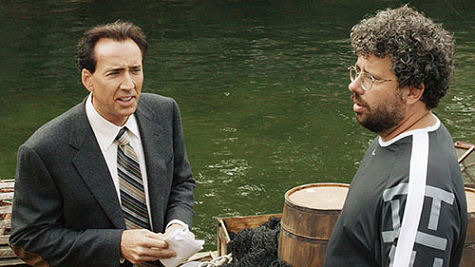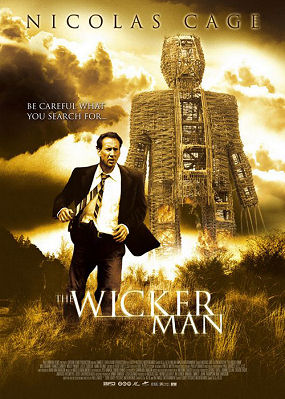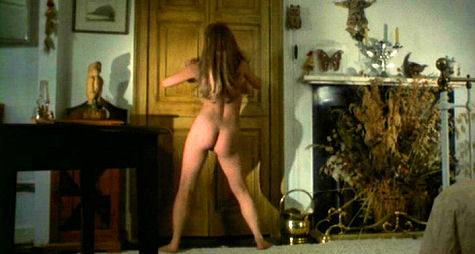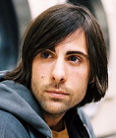Three days before World Trade Center opens and here‘s L.A. Daily News critic Glenn Whipp raising the United 93 Oscar flag. Go, Glenn! Oliver Stone‘s film is a thoroughly decent 7.8 on the HE scale, but Paul Greengrass‘s film is far superior and deserves all the salute pieces it can get.
The only thing “off” is that Whipp quotes David Poland as saying that United 93 “was not a powerful emotional experience for most people, and, as the academy goes, emotion leads intellect every time.” Of course, United 93 was nothing but emotional. The very idea of seeing it, in fact, was so emotionally threatening that a lot of people didn’t. What Poland tried to say but couldn’t quite articulate is that United 93 wasn’t sufficently emotional in the right way.
In other words, Academy members wanted a warm and reassuring 9/11 flick and Greengrass didn’t provide their idea of that. The irony is that “warm and reassuring” is precisely what United 93 provides by reminding us that Joe Schmoe Americans are made of very tough stuff indeed, and because of this courage what happened on that flight was one of this country’s absolute finest hours.
Month: August 2006
Carlyle Nicholson
This Peter Howell piece about inside jokes is pretty good, but just because I blanked on “Hey 19” — I don’t know the titles of any Steely Dan songs — doesn’t mean I missed it. Walter Becker and Donald Fagen may have written that letter-to-Owen with a jocular tone, but You, Me and Dupree did rip their song off, and they were definitely half-pissed. A person talking in a flip or cavalier way about something doesn’t mean they’re 100% joking.
What’s “inside” anyway? One of my first big-star interviews was with Jack Nicholson back in ’82, and during our chat I mentioned that aspects of his Shining performance were, to me, an inside joke. Nicholson disputed this. He didn’t say this in so many words but his response was basically who was I, a mere journalist, to assume I had an inside view of things? He wasn’t agitated — he was relaxed and grinning — but I remember him saying, “I’m inside,” meaning somebody else wasn’t.
Our interview took place on a brutally cold day at the Hotel Carlyle, around 10:30 or 10:45 am. When I first arived at the high-up suite I was greeted by publicist Bobby Zarem in the foyer. Nicholson was sitting down the hall and around the corner, but in earshot. “How are ya, Jeff?” Zarem asked. Manhattan had been going through a long frigid spell and I wasn’t wearing a warm-enough jacket that day to cope with 15 degree weather, so the first thing that came to mind was, “Cold as usual.” And a split second later I heard Nicholson doing an imitation of me, saying “cold as usual.”
Like a lot of X-factor guys, Nicholson has a way of jumping the track in terms of conversational threads. We got to talking about cold-weather jackets and he mentioned he expected to head downtown later that day to buy himself a nice warm one. “What are you looking for?”, I asked, meaning what kind of jacket (goose down, motorcyle jacket, retro). And Nicholson answered, “I don’t know. I haven’t known for quite some time.”
I remember he began sipping a Miller High Life in the middle of the interview, and my deciding to drink one also as a gesture of solidarity.
My deepest apologies to anyone who may be thinking I’ve waited too long (48 hours) to riff on Howell’s piece.
“Talladega” drops
Even though Sony is apparently projecting a $47 millon weekend tally for Talladega Nights, a rival studio is projecting $49,002,000. The Will Ferrell-Adam McKay comedy dropped 12% from Friday to Saturday. My guess it that it’s probably a bellwether of some kind.
Freshly Perverse
Freshly Perverse
In anticipation of Neil LaBute‘s The Wicker Man (Warner Bros., 9.1), yesterday I rented a DVD of Robin Hardy‘s ’73 classic of the same name. (The extended version, of course.) Sharply written by playwright Anthony Shaffer (Sleuth), it has a reputation of being an exceptionally creepy piece. Which it is, although it contains only one big jaw-dropper at the finale. Which there’s no forgetting. And yet it’s far from a horror film.
Boiled down, Shaffer and Hardy’s Wicker Man is a correctly mannered, somewhat dry parlor drama with an undercurrent of female eroticism and faint malice. It’s pretty much all talk and inference, but in the service of something quite strange.

Nicolas Cage, director-writer Neil LaBute during filming of The Wicker Man (Warner Bros., 9.1)
It’s about a rigid, devout, clearly uptight Christian policeman (Edward Woodward) visiting a pagan society on an island off the Scottish coast in search of a missing girl, and his being constantly deceived by the locals in a strangely uniform way. Every last islander is either blank-faced or oddly cheerful, which seems especially weird in view of what they’re all planning. Lo, how righteousness spirals upward to the heavens, contained in a twisting plume.
The Wicker Man wouldn’t work nearly as well without the hammer-like energy and fierce conviction that Woodward brings to his role of Sgt. Howie. There’s no ques- tioning this cop’s intense Christian convictions — he’s all about discipline, rectitude and butt-plug righteousness. And, of course, sexual repression.
< ?php include ('/home/hollyw9/public_html/wired'); ?>
What happens to Howie at the end is what The Wicker man is all about — a metaphor about the fast-eroding influence of traditional Christianity in the face of the newborn spiritual currents of the late ’60s and early ’70s (LSD mysticism, Bhagavad Gita, Tom Wolfe‘s “third great awakening”) and the general shirking of tradition.
What will the metaphor of the new Wicker Man be? Labute wrote the script (naturally), and one of his changes is that the remote island society is now matriarchal instead of patriarchal, as it was in the ’73 film. (In this light, Ellen Burstyn is the new Christopher Lee.) LaBute said at Comic-Con a couple of weeks ago that the film is at least partly about the fact that “women scare me more than men,” or words to that effect.
With men’s social dominance eroding over the last 35 or 40 years, their powers increasingly diluted and on the downswing and guys feeling less and less vital, it seems reasonable to assume that LaBute has made tthe growing stength and independence of women (and the way this has made some guys feel) the focus of his film.

What’s for sure is that LaBute hasn’t made a standard-issue Lionsgate shocker. More assaultive than the ’73 film, but relatively restrained by the standards of 21st Century jolts and gore. And however it turns out, something his and is alone.
In a piece by Charles Lyons in today’s , LaBute says, “Even if there are a few people who are pushing you in saying, `We would love it if this movie was Saw for the first weekend, and it was The Sixth Sense for the next five weeks, you ultimately have just one film that you can create.”
The Wicker Man “probably has a number of scenes that are bloodier than anything in the original,” Lyons reports, adding that LaBute “deliberately exercised restraint in using special effects that, as he put it, provide only a ‘moment’s pleasure.'”
LaBute’s film, says Lyons, “will echo its forebear’s intelligence, even if that means making the contemporary audience work a little harder than usual. ‘If The Wicker Man is a thinking person’s horror film,” says LaBute, ‘that’s great.'”
Like Sgt. Howie, Cage’s cop — called Edward Maulis in Labute’s film — is conservative-minded but more “suave” than Woodward’s character, or so Lyons reports.

This lewd and leering shot is from a scene always mentioned in any discussion of the ’73 Wicker Man — a musical number (yes, a musical number) featuring Britt Eklund, whose singing voice was dubbed by either Annie Ross or Rachel Verney.
One curious thing: Lyon’s article devotes five paragraphs to the fragile ego of Hardy, the original Wicker Man‘s director, specifically his conviction that he was slighted by the producers of the new version when they failed to show him a copy of LaBute’s script and/or declined to let him see the film. Five paragraphs out of 22 — more than 20% of the piece.
The point, I guess, isn’t that Hardy’s feelings are hurt as much as the Wicker Man team doesn’t want anyone knowing what they’re up to.
This seems to be so. The Warner Bros. marketing plan doesn’t seem to include letting guys like me see The Wicker Man early and possibly writing about it. I’ve been trying to get an early peek since early July, but the word all along has been, “We know that you’re a Labute fan but not yet…we’ll let you know.”
“Talladega” slap-down
Someone wrote this afternoon that “if someone tells you Talladega Nights is hateful, look at the hatred of the source” and that “only an arrogant jackass would suggest that large groups are too stupid to know they are being made fun of.”
Just for fun, let’s assume this guy was referring to my Talladega review. What I wrote (and what’s being indicated this weekend at the box-office) is simply that the people that Talladega “shits on the heaviest” — Southerners, NASCAR fans — “are going to be its biggest fans.” Where I come from that’s called irony. I didn’t say the NASCAR crowd is “stupid” to be liking this film. I didn’t laugh much when I saw it, but it’s got some funny stuff here and there. Co-writer Will Ferrell and director and co-writer Adam McKay know what they’re doing. They’re pros, I mean.
But what’s unmistakable, as I wrote a few days ago, is that “joke after joke, scene after scene, Talladega show us what total fools white-trash Southern hee-haws are. It says they’ve got no real values and they care only about conspicuous consumption, and that all they like to do is tear around in muscle cars, buy new stuff, serve their kids junk food and go apeshit at NASCAR races.”
I guess I didn’t put it the right way. Ferrell and McKay respect and admire local TV newsmen, which is where the humor in Anchorman came from. It came from love and affection. And now they’re chiding NASCAR fans affectionately, like one friend or family member to another. Oh, and there are no hee-haws, no rednecks, no downmarket sons of the South. These terms are evil media myths. Everyone is beautiful in their own way, and anyone who thinks differently needs to be shown the error of their ways.
“Night” question
After seeing Patrick Stettner‘s The Night Listener at a Sundance screening last January I wrote that “watching it felt like being in a kind of prison…a windowless isolation cell in Iraq during the Hussein regime. It’s a movie for dead people — the whole thing feels entombed. Almost every shot is enveloped in shadows and blackness, and your kindly torturer is a bearded and withered-looking Robin Williams . ”

Well, I saw it again last week and Stettner’s film has been slightly trimmed and tightened since Sundance. I got through it with less grimacing. But it’s still slow, shadowy, grim and odd.
Co-written by Stettner, novelist Amistead Maupin and Terry Anderson (and based upon a true episode in Maupin’s past) , it’s about a gay radio talk-show host named Gabriel (Williams) who’s become intrigued by a young AIDS-afflicted kid (Rory Culkin) he’s spoken to on the phone but has never seen, and about his search for the boy and some very curious encounters with a blind woman who says she’s the kid’s mom (Toni Collette ).
I haven’t read any reviews that have brought this up, so I guess I’ll have to: a 50ish gay man developing a fondness for a 14 year-old boy over the phone — hello? — feels icky.
A gay journalist friend explained to me last week that older gay guys having nurturing relationships with teenage boys isn’t necessarily what it seems to be. It can just an uncle-mentor type thing. Okay, but turn this around for a second. Would any movie deliver a story about a 50ish straight guy getting into a close relationship with an afflicted 14 year-old girl, and then have him try to visit her at home? Anyone who watches The Night Listener will be wondering about the undercurrent. But all the reviewers are dancing around it.
N.Y. Times critic A.O. Scott has written that “we understand that Gabriel, who nursed [his ex-boyfriend] through a period of life-threatening illness, needs someone to protect and care for, and that [Culkin’s character] represents a beguiling mixture of toughness and innocence”…and not a word about what anyone seeing this film would definitely be thinking.
HE Netflix Screenings
Hollywood Elsewhere’s self-sponsored follow-up to the Netflix Rolling Roadshow — a non-approved, unofficial fall sequel to the current tour — has just added (1) Elia Kazan‘s Viva Zapata! (’52) , to be screened at an open-air faciity near Olvera Street in downtown Los Angeles (Friday, 10.7), (2) Peter Yates ‘ The Friends of Eddie Coyle (’73) at an outdoor theatre adjacent to Boston’s Government Center (Friday, 10.14), and (3) Anthony Mann‘s El Cid (’61) at an undetermined location on 10.21. Admission is free. Bring your own food, drink and blankets. There’s just one problem…
De Becker on drunkeness
An argument against “in vino, veritas” has been written by security consultant Gavin de Becker in an open letter to Endeavor agent-partner Ari Emanuel, who suggested earlier this week that people in the industry should blacklist Mel Gibson over his anti-Semitic remarks. The letter appeared in Friday’s Hollywood Reporter, but it’s not linkable so here it is on Defamer. And here’s the Defamer intro .
“WTC” sell-job
Standard studio-produced sell-job video for World Trade Center, and yet it has a straight, comprehensive and emotionally honest tone. It’s viewable on I-Film. The idea behind this movie is catching on. I can feel this happening. But I still say Paramount should have snuck in this weekend.
Pudgeballs
Here‘s a N.Y. Times piece that’s a portrait of GenX males getting older and not getting married — marriage levels are down all over — and just shuffling along and scratching their heads. Written by Eduardo Porter and Michelle O’Donnell, the article is called “Facing Middle Age with No Degree, and No Wife.” It basically says that women with jobs and maturity and a firmer sense of responsibility don’t see that much upside in getting married to some 37 year-old dude who’s trying but not pulling down much of a salary. And so the guys whose careers aren’t going great guns are kind of getting pushed aside.
It seems as if a whole new social class is being formed — single middle-aged pudgeballs. (A pudgeball being a guy who was a major bong-head and ESPN-watcher and Frito-muncher in his 20s and early 30s but is now trying to grim up and fly straighter as he approaches the big four-oh.) Imagine hundreds of thousands of these guys amblin’ into their 40s and 50s, nudging the hockey puck along with the toe of their lace-up Converse shoes.
This ties in on some level to that piece I wrote in early July about “a trend in movies about GenX guys in their early to mid 30s who’re having trouble growing up. Guys who can’t seem to get rolling with a career or commit to a serious relationship or even think about becoming productive, semi-responsible adults, and instead are working dead-end jobs, hanging with the guys all the time, watching ESPN 24/7, eating fritos, getting wasted and popping Vicodins.”
Arthur Lee, R.I.P.
Take a moment and think about Arthur Lee, who died Thursday from lukemia at age 61. And if you don’t have a CD of Forever Changes in your collection then I guess that’s your choice. You can always do something about this later on.
Darjeeling brothers
Recapping for precision’s sake: The three Darjeeling Limited brothers are going to be Adrien Brody, Jason Schwartzman and Owen Wilson. In Movieland, as we all know, brothers rarely look like each other and there’s almost never any resemblance — none — between parents and their kids. But The Darjeeling Limited is a Wes Anderson pic, and Andersonville is a much more particular and exacting place, and the usual bullshit doesn’t apply.



(l. to r.) Jason Schwartzman, Adrien Brody, Owen Wilson
So with this in mind, I have to say I’m having a little trouble with these three being from the same brood. I’m seeing vague gene-pool sharings between Schwarztman and Brody, and Brody and Wilson both have big thin noses…but in real life it would be tough to accept that Wilson and Brody are cousins, much less brothers. Well, maybe. I could buy into it a little easier if Wes’s script gives them different mothers or fathers.
